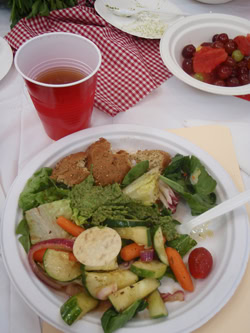It’s been said that nothing triggers memory quite like food. Science shows that taste and smell activate specific memory sites in our brains, helping us to recall earlier moments and experiences. Food itself is an extension of the past into the present. Carrots, potatoes, and peas are little time travelers from our ancestors plates to our own, connecting us in a sort of edible time loop. The spinach that was is the spinach that is.
So, when I saw the announcement that cookbook author, Angela Shelf Medearis, would offer A Taste of Juneteenth buffet meal this month in Austin, I knew that it would highlight some powerful connections between food and African American history. I first learned about Angela in the early development phase of the African Heritage Diet Pyramid. She has written eight cookbooks, including one of my favorites The Ethnic Vegetarian plus dozens of children’s stories. She’s beaten Bobby Flay in one of his televised Throw-Downs. She’s the host of her own cooking show, The Kitchen Diva. And, she’s made Dr. Oz a believer in healthy Mac n Cheese by serving him a bowl dressed with tofu.
Juneteenth is celebrated every year on June 19th, the day that Abraham Lincolns Emancipation Proclamation took full effect in the state of Texas, one of the last rebel states to abolish slavery. (Freedom was declared in Texas on June 19th, 1865, just a few months before the 13th Amendment was ratified, making the abolition of slavery a part of our Constitution.)
Today, 42 states observe Juneteenth with parades and events. I had the privilege of being in Texas to celebrate this year, at the George Washington Carver Museum in the state’s capitol. It’s an important day in the memory of Americans, particularly African Americans.
What do the foods behind this memory of Juneteenth look like Angela showed us.
She opened the event by talking about the beautiful, healthy foodways of early African Americans. She connected these ways to the food cornucopia we saw before us.
Appetizer:
As the centerpiece of our tables, we had a black-eyed pea and spinach puree. With the consistency of hummus and the pizzaz of pesto, no one could guess the simple ingredients. Two spears of pickled okra sat on top, served with sesame crackers for dipping. Sesame seeds (called benne seeds in Africa), okra, black-eyed peas, and leafy greens are some of the seminal foods of African heritage. It’s always amazing to me how traditional foods incorporate the best of our modern day nutritional buzz naturally gluten free, vegan, organic, local, etc.
Entrée:
Angela emphasized that the traditional African and African American diets were vegetarian-based. Traditionally, meat was eaten in trace amounts or on very special occasions. To reflect this, Angela prepared several vegetable entrees, with a single meat choice: small, marinated, skinless, boneless chicken breasts. She joked that when you take meat of of your grocery list, you’ll see your shoe collection grow exponentially because of all the money you save. Her husband afirmed this with an emphatic nod and eye-roll that made us all laugh.
Angela served us from behind a buffet line, where she crowded our plates with veggies, adding one small piece of chicken if requested. Many people opted for either no chicken or just one piece to eat more in line with their ancestors.
On this hot Texas day, we were served:
- A cold salad of mixed steamed vegetables
- A cold salad of mixed greens
- A dressing of olive oil, vinegar, and agave nectar
- Whole wheat and whole grain rolls
- Small marinated, skinless, boneless chicken breasts
- And a cold salad of fresh fruit with an optional Greek yogurt topping
Beverage:
We were told that it wouldn’t be an African American cultural celebration without sweetened iced tea. Angela’s latest cookbook is the Kitchen Diva’s Diabetic Cookbook so, how did she get around the many teaspoons of sugar needed to make the authentic flavor pop Instead of sugar, Angela used liquid drops from the stevia plant a natural sweetener that puts sugar to shame in its concentrated sugariness and that has a stabilizing effect on blood sugar!
All in all, the day really celebrated two freedoms: one, a freedom past from slavery, and two, a future free from chronic disease. With just a few food liberties taken (like the stevia), this authentic African heritage spread fed our memories and our health. It’s a way of eating that helped a group survive experiences as horrific and arduous as the Middle Passage and slavery. It’s a way of eating that once was and can be today.
Summer opens the door to the outdoor barbecues and parties we all love, and Angela’s Juneteenth menu shows what we can bring when we invite a little extra meaning and family roots through heritage foods.
I plan on interviewing Angela in a near future blog to share more on cooking diva-ness, so please do stay tuned!







Leave a comment